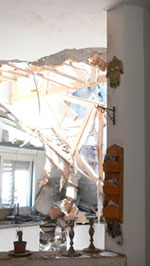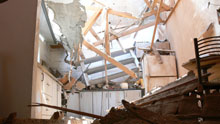 Vampire Weekend's Surprising Jewish Stories
Vampire Weekend's Surprising Jewish Stories


4 min read
3 min read
4 min read
< 1 min read
The relentless rocket fire on Sderot has made the lives of its residents insufferable.
Over the next few weeks, Israel will face an avalanche of world pressure, orchestrated by terror groups and foreign governments to declare yet another ceasefire.
"Cease fire" would represent an inaccurate adage to describe the last six months of life in Sderot. It was more like “We Cease -- They Fire,” with over 350 deadly missiles fired from Gaza at the Western Negev during the period decribed by the media as a "cease fire", , November 26th-May 15th . And 260 missiles were fired landed between May 15th and .May 30th.
The government is finally paying attention to events in Sderot. With attacks from Gaza reaching 20 missiles a day, it had to get involved. Two people were killed last week, and media attention soared. When it bleeds, it leads.
The question on the mind of every resident here is whether the Israeli government doing enough to help Sderot and the Western Negev.
 A case in point: Almost half of Sderot's large communal shelters have no water or electricity, and they have been rendered unfit for human habitation.
A case in point: Almost half of Sderot's large communal shelters have no water or electricity, and they have been rendered unfit for human habitation.
It takes two to three months to repair these shelters.
Only now does the Sderot Municipality have the budget to do so -- from a foreign charitable organization, not from the government.
Meanwhile, the government is repairing only ten percent of the 2000 Sderot homes which need to have a protected and secure room, leaving the other 90 percent at risk, since the local municipality has been allocated no additional budget to solve this problem.
Parents know they cannot assure their children's safety, not at school and not at home.
And then there is the situation in the schools. The government made an arbitrary decision to protect classrooms only through the third grade, leaving other children in Sderot's educational institutions to run for cover in the 15 seconds that the siren allows for, until the missile hits.
The Sderot Parents Association had to bring a suit in the Israel High Court of Justice last February to demand that all classrooms be protected. The court gave ample time for the government to show a plan to protect all the classrooms, yet the government came up with no plan of action.
This week, the Israel High Court of Justice ruled in favor of the Sderot Parents Association and issued a court order to the Ministry of Education to protect ALL classrooms. That will take two or three months.
The psychological effects that the missile attacks have had on the children of Sderot are innumerable.
A Magen David Adom worker recently told me that had been called in to see a six-year-old girl who had seen a missile penetrate a wall near her bedroom.
When the ambulance crew came for her, she was speechless and petrified. She has been in treatment for months. The psychological damage that she has suffered will last for years to come.
Parents know they cannot assure their children's safety, not at school and not at home. This is hard for a parent to live with.
The Arab terrorists in Gaza use a media tactic with regard to the timing of their missile attacks. Just as the Hezbollah had done north, they petrify the Israeli public by firing missiles synchronized with Israel's prime time newscasts in the evening, so that breaking news of the attack will reach the maximum Israeli audience.
Over the past few months, following missile attacks in Sderot, I have arrived within minutes to film and photograph more than a dozen families whose homes had just been demolished or damaged by missiles.
I have witnessed ambulance and police cars rush to assist critical injuries, while treating people in an atmosphere of mass hysteria and commotion after the impact of the missiles.
When you are outside during an attack, you have to run to the nearest wall or shelter in an effort to avoid being hit.
I'll never forget the time a missile scored a direct hit on a synagogue. It was nothing short of a miracle that the synagogue study hall happened to be empty, because it was being cleaned after a ceremony dedicating a new Torah scroll the night before.
WHAT CAN PEOPLE DO?
A missile fired at Sderot is a missile fired at the people of Israel.
Make your voice heard. A missile fired at Sderot is a missile fired at the people of Israel.
"The reports in the media do not portray an accurate picture of the reality of life in Sderot," said Dror Marsha, the town's volunteer coordinator. "We deal with constant stress and anxiety, knowing that a rocket might fall on us at any given moment. Daily routine is at a standstill. Yet, the hardest thing we face is the feeling we were abandoned. We know people around the world care about us and follow the events, but the thing we need most is a feeling of solidarity, the human touch."
Since the situation in Sderot deteriorated, Marsha hasn't stopped running around town, trying to alleviate fears, support and help the elderly who are particularly vulnerable, hug the traumatized children and move the disabled to shelters away from the town. Yet, he is the first to admit that as time goes by, he too needs help. "Our job turned into 100 percent emergency care," he said. "All of us, social workers, education and welfare professionals, guides in the youth centers, and psychologists deal with nothing but emergencies. The continued attacks expose us to problems we were not aware of. We want to help but don't have the time."
 To assist them, and to express solidarity and support the residents, volunteer. No need for professional experience or a long-term commitment. It's enough to visit a family, assist an elderly citizen with grocery shopping, or play with the children, to prove to the residents they are not alone. Following is a list of available volunteer projects in Sderot, organized with the help of "Ruach Tova" .
To assist them, and to express solidarity and support the residents, volunteer. No need for professional experience or a long-term commitment. It's enough to visit a family, assist an elderly citizen with grocery shopping, or play with the children, to prove to the residents they are not alone. Following is a list of available volunteer projects in Sderot, organized with the help of "Ruach Tova" .
Home visits: Help those who fear leaving their house with grocery shopping, talk and listen to the people, show your support.
Elderly citizens: Help with chores, food and medicine shopping, support lonely people and alert the authorities in cases of emergency.
People with special needs and the disabled: There are about 1,500 people with special needs in Sderot. They need help with chores and would appreciate a visit.
Manning Sderot's 24 hours emergency center: Pinpointing needs, directing requests for assistance to the municipality and the welfare department.
Homes damaged by the rockets: Owners of homes that were hit by rockets have to clear the rubble themselves. Being there with them will help them deal with the situation and will be a great practical help.
Children: The children of Sderot suffer from anxiety and stress emphasized, in many instances, by their parents' distress. Distract them, even for an hour, by playing with them or reading a story to them.
Preparing shelters: There are 22 shelters in Sderot but only two are operational. The rest must be fixed and cleaned so they could be used.
For more information on Sderot, visit www.SderotMedia.com.
-- With thanks to Ynetnews.com who contributed to this article.
